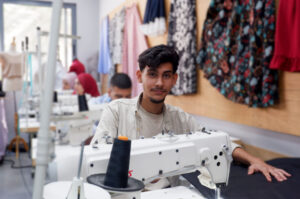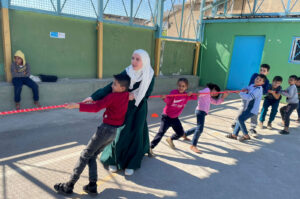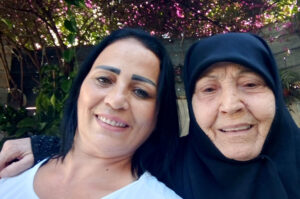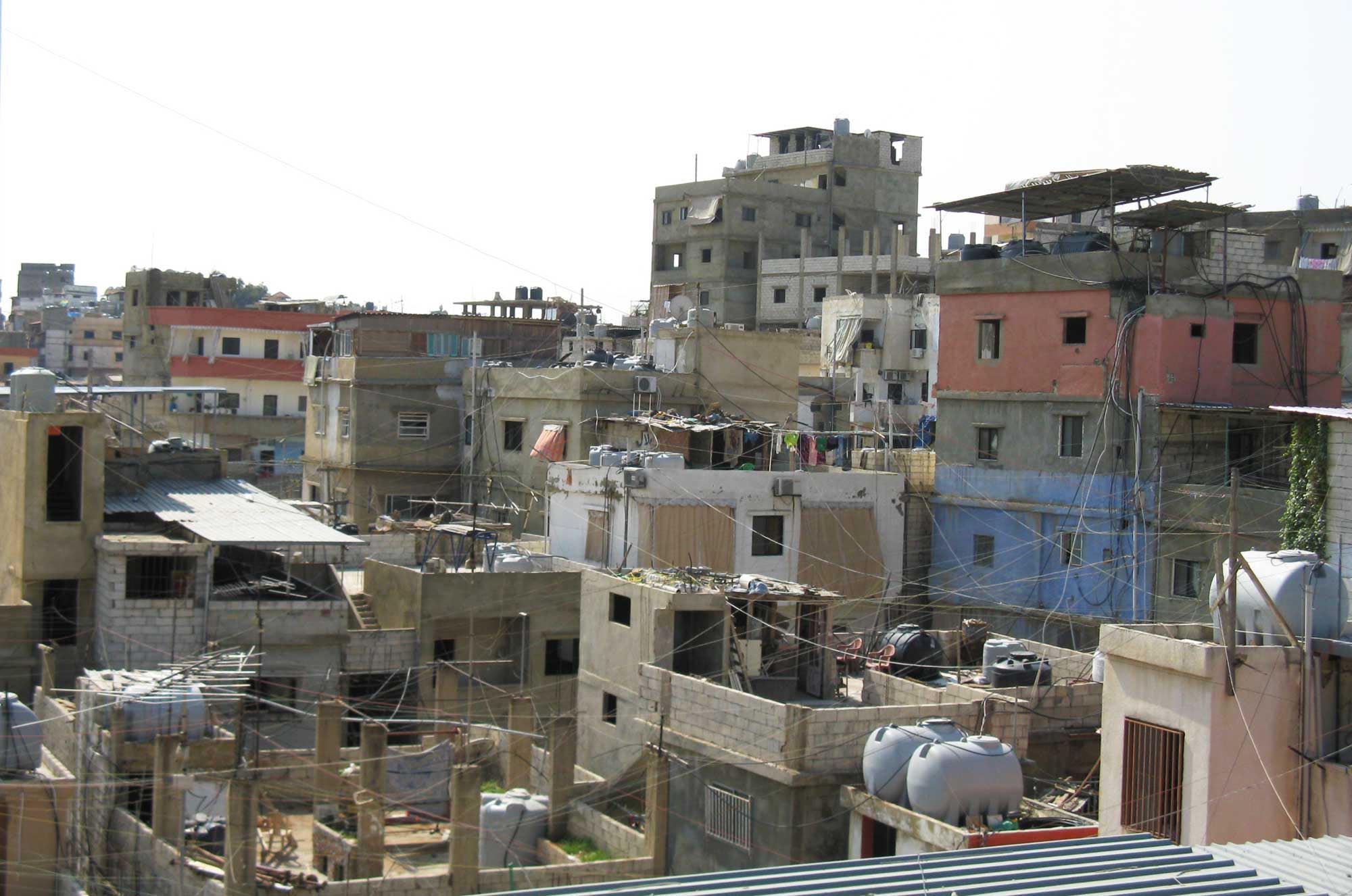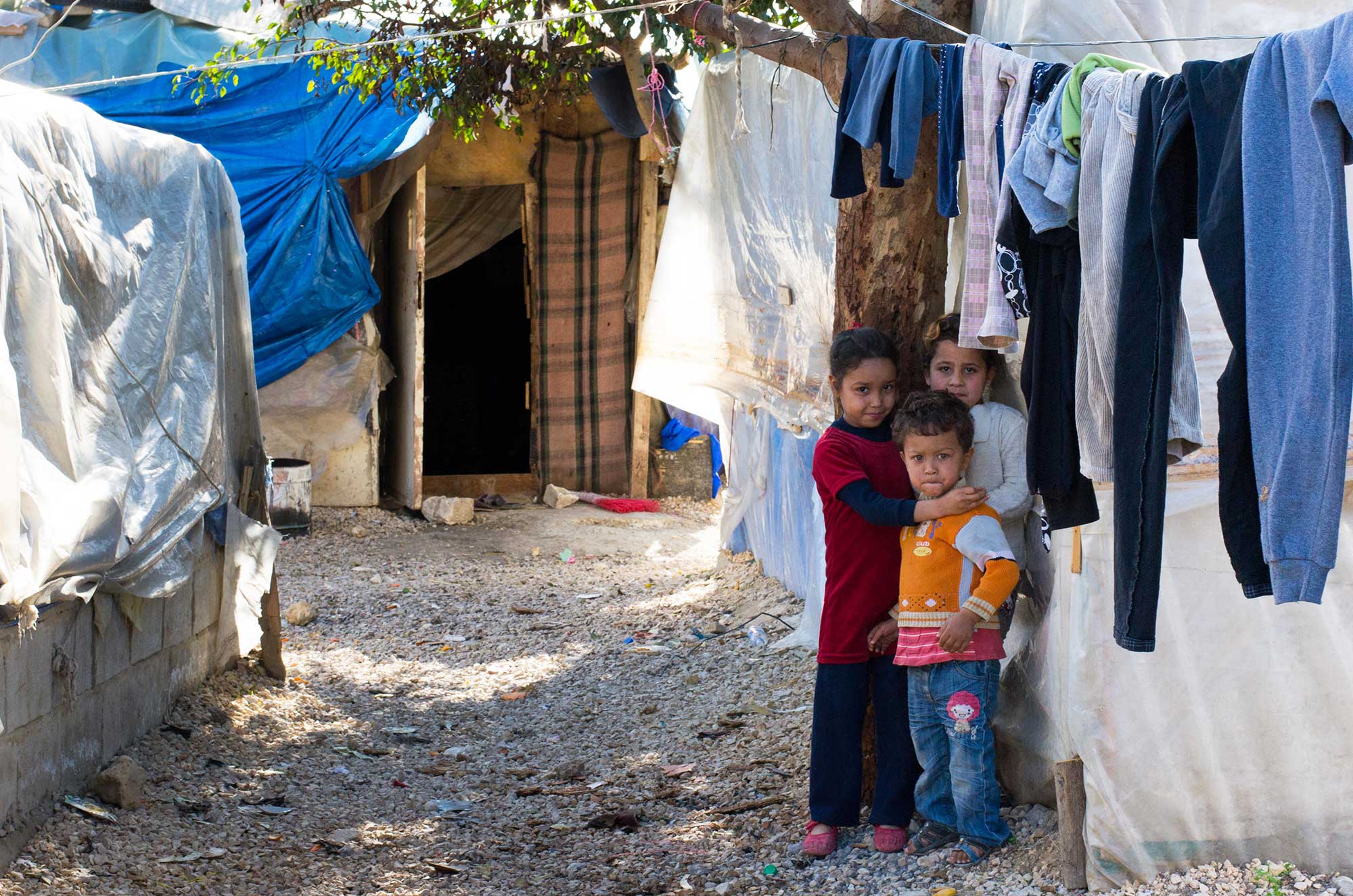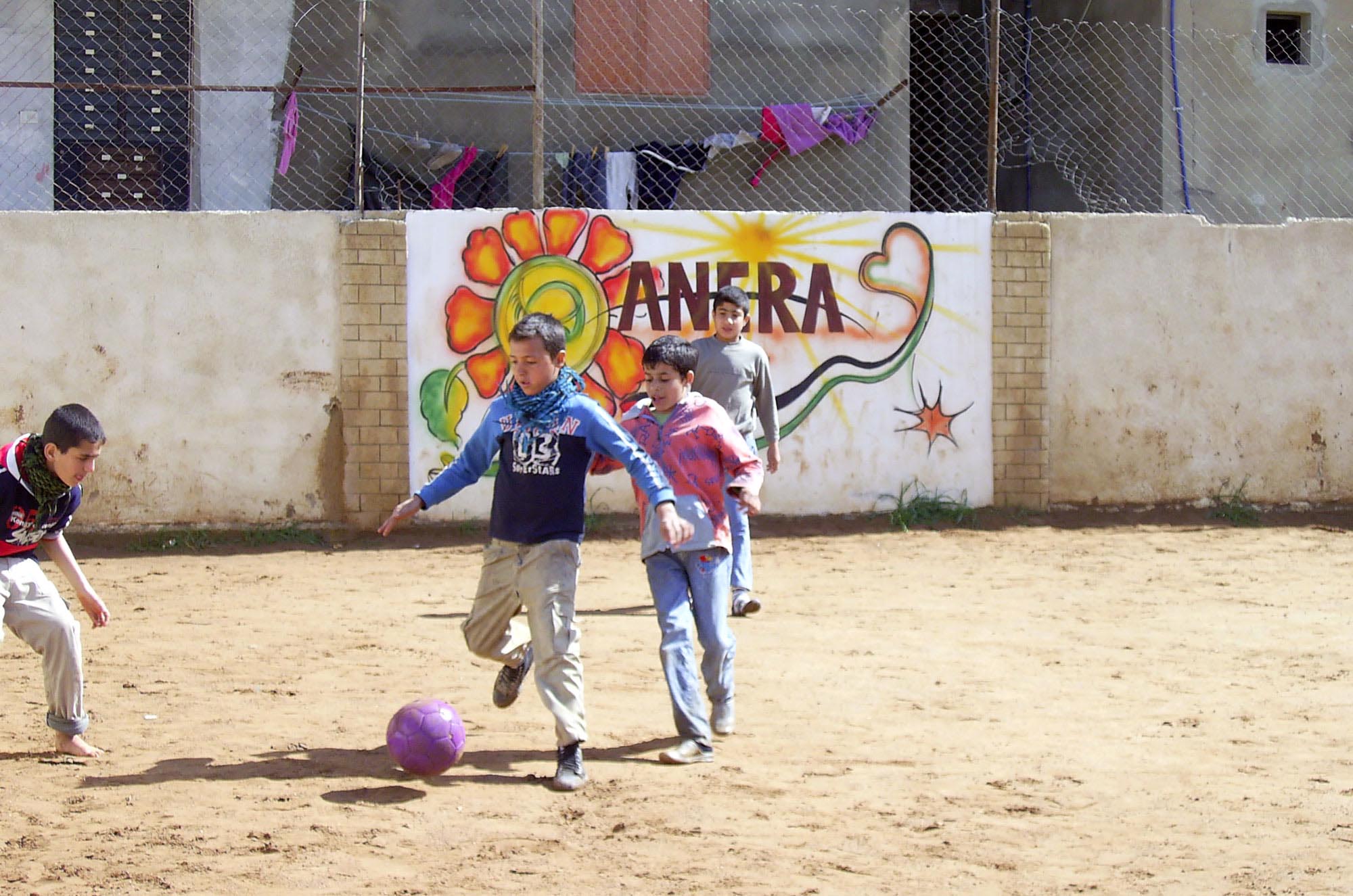Anera is actively responding to the urgent humanitarian needs in Lebanon. Your support will help provide displaced families with bedding items, hygiene kits and medical supplies, and winter clothing.
The Growing Vulnerability of Many Lebanese Families
Since late 2019, Lebanon’s economy has collapsed, impoverishing formerly middle class families and leaving millions struggling just to get by. According to the UN, approximately three-quarters of Lebanon’s population now live below the poverty line.
Many Lebanese have seen the value of their wages, pensions and bank accounts plummet along with the currency. Unemployment is high, especially for youth. Millions of people are now food insecure — many for the first time in their lives.
The social safety net system has always been weak in Lebanon but, due to the economic collapse, it barely functions, if at all. More and more people are relying on private and non-profit organizations to provide support they might otherwise have expected from their government. Historically, for instance, Anera provided some support to disadvantaged Lebanese communities, but most programs benefited refugees. Now, at least 50% of the people that Anera serves are Lebanese.
Anera Contributes to Lebanon's Recovery
The international community would like to see Lebanon put in place wide-ranging economic and financial reforms so billions of dollars of investments can flow into the country. But an official recovery plan is still forthcoming. In the meantime, Anera's programs are contributing to real time improvements on the ground.
Our humanitarian and development projects in Lebanon intertwine to build livelihoods, foster civic engagement, and create long-term change. Education projects train young people in skills they can put to work right away to help their communities. They earn money, help their neighbors and gain professional experience all all at once. Our medical aid program delivers vital medicines across the country, while community workers run health awareness sessions. Our food security projects not only deliver aid in the form of vouchers and food parcels, they also build greenhouses and train families in farming best practices.
Anera has a vast network of local partners, from major healthcare institutions like the American University of Beirut Medical Center and the Saint George University Medical Center to community-based organizations like the Routes for Development Center and Al Mouwasat Organization. Through these relationships we are able to deliver programs that touch many aspects of people's lives. Anera works with all vulnerable communities in Lebanon, without regard to religion or national origin, helping to ensure that aid does not become a flashpoint for community tensions.
Funding for Anera's programs in Lebanon comes from UNICEF, OCHA, UNHCR, the World Food Programme, family foundations and thousands of individual donors. Below are some of our priority areas of work in Lebanon.
Our Latest Stories from Lebanon
Learn About Anera's Deep Roots in Lebanon
Anera has delivered programs in Lebanon since the 1970s. Choose a governate and click to learn more about Anera's work in that area.
Akkar
Current Projects
- Mitigating incidents of early marriage and supporting vulnerable girls
- Providing technical, vocational, and basic educational training to youth
- Delivering medical aid and supplies to hospitals and clinics
- Installing greenhouses and training farming families
Recent Projects
- Built a sorting facility and improved recycling practices in the village of Mashha
- Delivered hygiene and winterization kits to vulnerable communities
- Rehabilitated sports fields and playgrounds
- Brought dental healthcare to youth in Syrian refugee camps
Learn more about our long history and work in Akkar
Baalbek-Hermel
Current Projects
- Implementing a vocational education program to provide technical and soft skills
- Delivering medical aid and supplies to hospitals and clinics
- Regularly providing chronic disease medications to 20 healthcare facilities
- Conducting awareness sessions and distributing kits for menstrual health
Recent Projects
- Constructed a solid waste sorting facility in Majdal Anjar
- Responded to COVID-19 by delivering personal protective equipment
- Delivered winterization support to Syrian refugees suffering in cold temps in Arsal
- Improved water management techniques on farms in Barqa and Rabiaa
Learn more about our long history and work in Baalbek-Hermel
Beirut
Current Projects
- Implementing a vocational education program to provide technical and soft skills
- Delivering medical aid and supplies to hospitals and clinics
- Providing scholarship support to nursing students at reputable universities
- Conducting awareness sessions and distributing kits for menstrual health
Recent Projects
- Rebuilt homes and businesses damaged by the port explosion
- Provided financial assistance to hospitals after the explosion
- Delivered humanitarian relief in the form of food, hygiene kits, shoes and more
Learn more about our long history and work in Beirut
Bekaa
Current Projects
- Teaching technical skills and providing apprenticeships leading to good jobs
- Conducting awareness sessions and distributing kits for menstrual health
- Delivering medical aid and supplies to hospitals and clinics
- Training young people in skills related to basic literacy, math, writing, and IT
Recent Projects
- Equipped 12 healthcare centers with solar
- Galvanized nearly 300,000 Bekaa residents to recycle
- Built a waste sorting facility in Majdal Anjar
Learn more about our long history and work in Bekaa
Keserwan-Jbeil
Projects
- Delivering medical aid and supplies to hospitals and clinics
Learn more about our work in Keserwan-Jbeil
Mount Lebanon
Current Projects
- Teaching technical skills and providing apprenticeships leading to good jobs.
- Conducting awareness sessions and distributing kits for menstrual health
- Delivering medical aid and supplies to hospitals and clinics
- Training young people in skills related to basic literacy, math, writing, and IT
Recent Projects
- Renovated the Haifa Hospital emergency room in Burj El Barajneh
- Distributed winterization kits and shoes in refugee camps
- Employed sewing graduates to make 100,000 face masks against COVID-19
- Hosted sports activities in Shatila with trainers from Inter Milan
Learn more about our long history and work in Mount Lebanon
Nabatieh
Current Projects
- Supporting vulnerable chronic disease patients with regular deliveries of medicines
- Training young people in job skills
Completed Projects
- Provided chemotherapy medicines to the Nabatieh Public Hospital
- Rebuilt livelihoods after the 2006 war
- Promoted cost-effective, good health practices in impoverished communities
Learn more about our long history and work in Nabatieh
North Lebanon
Current Projects
- Delivering medical aid and supplies to hospitals and clinics
- Planting rooftop gardens to support food security and small businesses
- Providing dry food parcels during Ramadan
- Delivering non-formal and vocational training programs
Recent Projects
- Created a “model neighborhood” of 350 homes in Nahr El Bared, mobilizing residents to sort waste at home
- Installed a kidney dialysis unit at Safad Hospital in Beddawi
- Installed solar panels at the Women's Programs Association in Beddawi
- Provided monthly cash assistance to 250 impoverished families in Tripoli
Learn more about our long history and work in North Lebanon
South Lebanon
Current Projects
- Delivering non-formal remedial education in Arabic literacy, math, English
- Providing youth with job skills, hands-on training and paid internships
- Building rooftop gardens complete with greenhouses and planting materials
- Distributing medicines for chronic conditions, equipment and health supplies
Recent Projects
- Distributed thousands of school kits in Ein El Hilweh
- Installed solar panels at the Tofahta Clinic
- Built a staircase for residents of Jabal Al Halib (Milk Mountain) in Ein El Hilweh
- Trained families in Rashidieh and Burj El Shemali solid waste sorting at home
Learn more about our long history and work in South Lebanon
Improving Livelihoods
Anera prepares young people for jobs in desirable fields. Through short, skills-based training courses, we are helping Lebanese and refugees take charge of their futures. Students, many of whom dropped out of school years ago, learn skills that the local market demands, in areas like nursing and construction. After completing courses, we provide cash-for-work employment opportunities to improve communities and help families. Anera also arranges paid internships with local commercial enterprises to gain real-world experience. Some internships lead directly into full-time jobs!
Teaching Basic Education
Anera’s basic education classes bring together youth from all backgrounds for classes that build community and help young people gain the skills they need to take control of their futures. Courses in life skills, basic math and literacy, and good hygiene practices combine to benefit young people’s lives in practical, immediate and tangible ways. Anera bases the timing, location and subjects of classes on the everyday reality the students face.
Bolstering Personal & Environmental Health in Lebanon's Communities
Anera organizes activities that promote healthy behaviors. Our outreach includes topics like protecting the environment, menstrual well-being, and COVID-19 prevention. We distribute hygiene supplies and employ young people to help us carry out the activities, including many women leaders. Anera's solid waste management campaigns in the Bekaa Valley, Akkar and Palestinian camps has had a major impact on recycling habits and attitudes about household waste. And our awareness sessions on menstrual health have broken down stigmas and helped girls take more control of their lives.
Delivering Humanitarian Relief and Vital Medicines
Anera started in Lebanon by delivering humanitarian relief during the civil war. The program has grown larger in scope and value over the past 40+ years, as the country continues to host large numbers of refugees and, more recently, has seen its economy collapse. The medical aid program is Anera's largest in terms of value. In fiscal year 2022 alone, we delivered $28 million worth of medicines and healthcare supplies to clinics and hospitals across Lebanon. Another aspect of Anera's relief work is delivery of kits containing a variety of items, such as food and hygiene products.
Combating Food Insecurity
With the majority of Lebanon’s population living below the poverty line, food insecurity has emerged as a major problem. To help families cope, Anera distributes parcels filled with large quantities of nutritional, filling food. We also put our cooking students to work making and distributing hot meals during times of acute crisis. And Anera is helping some families to combat food insecurity in their own backyards. We are building greenhouses, installing irrigation systems, providing seedlings, and delivering training on good agriculture techniques. Families we assist can feed themselves and sell produce for extra income.
Rebuilding Beirut
To address the dire need for rehabilitation and repairs in the wake of the Beirut blast of August 2020, Anera established a shelter program. We identified homes in vulnerable communities, households with large families, female headed households, seniors or refugees in order to provide necessary rehabilitation for those who likely could not afford to rebuild otherwise. Anera repaired 1,198 homes and small businesses that were damaged in the Beirut explosion, providing families with safe refuge and living conditions and allowing shops to reopen and re-employ their staff.
Organizing Sports Activities to Foster Life Skills
Anera offers sports and life skills activities to youth in Lebanon. The programs emphasize social interaction, mentorship and cross-community bonds. Anera also rehabilitates sports fields through the program, providing badly needed safe spaces for physical activity for young people in vulnerable and densely populated communities.
BY THE NUMBERS
Lebanon's Refugee Camps
12
Palestinian refugee camps
Most were created in 1948 to cope with the influx of refugees from the Arab–Israeli War.
2,000+
informal Syrian tented settlements
These camps are spread all over the country, with the largest concentration in the Bekaa Valley.
45,000
"twice refugeed" Palestinians
In the last ten years, many Palestinian refugees who fled the war in Syria are resettled in Lebanon's Palestinian camps.
What Happens When You Donate to Lebanon
Making a gift today will support Anera's operations in Lebanon, which have grown substantially to cope with the Syrian refugee crisis and the recent economic collapse. We have five offices throughout the country, staffed by 60 employees who all come from the communities they serve. Anera has decades of history of providing aid to Palestinian and Syrian refugees and other disadvantaged groups amidst regional conflicts.
We work together with other nonprofits to provide resources in these areas thanks to support from people like you.
- Education: Thanks to donors like you, tens of thousands of young people in Lebanon learn language, math and job skills that better future opportunities. Our vocational education programs offer Lebanese and refugee youth a chance to learn valuable skills that position them to find decent work.
- Health: Your donation supports hospitals and clinics across Lebanon, helping families get the medicine and treatment they need in a country where few people have medical insurance.
- Water, sanitation and the environment: Youth-led initiatives use donations from people like you to create cleaner and healthier environments. In Lebanese villages, Syrian refugee settlements and Palestinian refugee camps, your donation will go toward efforts to make communities safer and greener through better solid waste management, minimizing waste through recycling and composting.
- Community: Your gift supports community initiatives that bring youth together, teach job skills and encourage healthy behaviors.
- Emergency: When you donate to Anera, we will use your gift to support refugees and other disadvantaged people during difficult times, like the Beirut port explosion.
Lebanon has the largest per capita population of refugees in the world. As of 2020, the Lebanese government estimates their country hosts 1.5 million Syrian refugees. Close to 300,000 Palestinian refugees also live in Lebanon. In the face of poverty, war and political instability, Lebanon works with key international organizations such as Anera to give these refugees a place to live.
The Situation for Syrian Refugees in Lebanon
Syrian refugees live in informal tent settlements, abandoned buildings, or cramped spaces in the country’s decades-old Palestinian camps. This situation has put a strain on the country's already unstable economy, infrastructure and social systems — and made addressing challenges even more complicated for non-governmental organizations on the ground.
Those Syrian refugees who are able to find work usually face pay discrimination based on their refugee status. Statistics indicate that 80 percent of Syrian refugees earn less than their host country peers. And, while Syrian refugee youths are legally entitled to attend Lebanon’s public schools, they face formidable barriers, from a different language of instruction to having to work to support their families.
Life for Palestinian Refugees in Lebanon
Palestinian refugees first arrived in Lebanon in 1948 as they fled from the Arab-Israeli war. Today, Palestinian refugees and their descendants don't have the same rights and resources as Lebanese natives due to their legal status. Without formal citizenship, they have no social, political or economic liberties. All refugees, Palestinian and Syrian, in Lebanon also have limited job and educational opportunities and endure poor living conditions.
Refugees in Lebanon from Palestine live in 12 official camps, as well as many informal gatherings and communities alongside Lebanese citizens. When Palestinian refugees originally arrived in Lebanon, refugee camps built shelters as temporary housing. Those same buildings remain, housing ever growing numbers of people while deteriorating over time due to restrictions on building in the camps. Refugees still live in these structures because their lack of citizenship and work permits prevents them from owning property or earning an income in many fields of work.
Lebanon's Palestinian Refugee Camps
About 45 percent of the 470,000 refugees registered with UNRWA in Lebanon live in the country's 12 Palestinian refugee camps. In addition to the original Palestinian refugee population, many Palestinian refugees from Syria have settled in the camps. Some Lebanese and foreign residents also live in some of the Palestinian camps, particularly Shatila. Residents of these camps deal with poor housing conditions, overcrowding, poverty and unemployment. The 12 official Palestinian refugee camps:
- Rashidieh Palestinian Refugee Camp
- Burj El Barajneh Palestinian Refugee Camp
- Shatila Palestinian Refugee Camp
- Beddawi Palestinian Refugee Camp
- Burj El Shemali Palestinian Refugee Camp
- Dbayeh Palestinian Refugee Camp
- Nahr El Bared Palestinian Refugee Camp
- Mar Elias Palestinian Refugee Camp
- Wavel Palestinian Refugee Camp
- Mieh Mieh Palestinian Refugee Camp
- Ein El Hilweh Palestinian Refugee Camp
- El Buss Palestinian Refugee Camp
These are just three of the camps where Anera maintains programs:
Ein El Hilweh Palestinian Camp
The Ein El Hilweh camp has the largest concentration of Palestinian refugees in the country. Its residents face poor living conditions, limited employment opportunities and a high number of out-of-school youth.
Nahr El Bared Palestinian Camp
Nearly 30,000 Palestinian refugees — including around 1,200 Palestinian refugees from Syria — live in the Nahr El Bared camp. Armed clashes and the near-destruction of the camp led to ongoing challenges with displacement, a lack of resources and limited opportunities.
Burj El Barajneh Palestinian Camp
Located in Beirut, the capital of Lebanon, the Burj El Barajneh camp has about 31,000 refugees. Limited job opportunities, restricted infrastructure and a lack of funding for schools and medical facilities lead to many difficulties for residents.
Supporting Hygiene in Refugee Camps in North Lebanon

